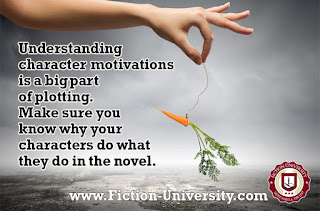Knowing what motivates a character to act not only makes for a great read, it also makes it easier to plot.
Understanding character motivations is a big part of plotting. Why your characters (especially your protagonist and antagonist) do the things they do determines how your plot unfolds, since they'll have reasons for choosing Option A over Option B.
Of course, showing those motivations without banging a reader over the head can be the hard part. Especially if the reasons aren't clear to the character.
While you don't have to know every single reason why your character does every little thing, if what they do affects the plot or story, it's a good idea to know why they did it. Otherwise, you might end up with a reactionary protagonist or a character who's just acting out plot, but doesn't really care about what happens. Those kinds of characters can leave a story feeling flat and lifeless.
Take a look at your scenes and your characters' motivations. Ask yourself:
Is it a conscious motivation?
Conscious motivations are the easiest to convey, because they're the ones most likely driving the full force of the plot. You probably know what your character wants and why they want it. They'll probably even state outright why they're acting as they are in the story.
For example, someone trapped in a burning building is going to look for a way out to save their life. Their actions probably won't need a lot of motivational explanation. A woman trying to find out whose number was on a lipstick-smeared napkin in her husband's pocket is also easy to figure out. Odds are, she'll even think "Who's number is this? Is he having an affair? Maybe I should call it?"
What does your character consciously want and why do they want it?
- Can they think about why they want to act?
- Can they state the why outright through dialogue?
- What types of actions suggest the motivation without spelling it out?
(Here's more on Two Questions to Ask for Stronger Character Goals and Motivations)
Is it an unconscious motivation?
 Unconscious motivations are trickier, because the character doesn't realize why they're behaving as they are. Teens acting out to get attention is a good example here. They want to feel loved/noticed/needed but their goals are to stay out late or skip school (or worse), because that will trigger a reaction in the person they want that from (often the parents). Their actions don't convey what they really want, or why they want it, because they aren't fully aware of it.
Unconscious motivations are trickier, because the character doesn't realize why they're behaving as they are. Teens acting out to get attention is a good example here. They want to feel loved/noticed/needed but their goals are to stay out late or skip school (or worse), because that will trigger a reaction in the person they want that from (often the parents). Their actions don't convey what they really want, or why they want it, because they aren't fully aware of it.To show these unconscious goals, consider external ways they might express those internal needs. For example, if they want love, they might notice other people in love or spot shows of affection, and then react viscerally to them. They might get angry when their actions don't get the desired response. They might yell "Why can't you just accept me?" showing they want this acceptance, even though they're doing everything they can to rebel against it.
Let them think about or notice the things they do want:
- Can you show their motivation by what they don't do or say?
- Can they think one way and act another?
- Can they comment on what they unconsciously want to do in an offhand manner?
- Can they act in a way that alludes to the unconscious motivation?
(Here's more on The Ultimate Guide to Character Motivation (Part 1)
Is it a deliberate motivation?
Deliberate motivations are different from conscious ones, in that the character is very aware of why they're acting as they are. They have a plan, a specific expectation of what they're getting/causing/doing by acting in a particular way. Odds are they'll state exactly why they're acting this way and what they hope to gain by it.
For example, that wife who thinks her husband is cheating on her might deliberately mention infidelity just to see his reaction. She might create situations that force him to lie. Her actions have a very specific purpose.
Have your character be aware of why they're acting this way:
- Can they think about why they want to act?
- Can they spell out their plan to a friend?
- Can they ask leading questions that suggest why they're acting?
- Can they try to talk themselves out of it? Into it?
(Here's more on Goals-Motivations-Conflicts: The Engine That Keeps a Story Running)
Do you need to show the motivation?
While it's useful to know why your characters do something, trying to show every single motivation can bog a story down. Sometimes you just want them to brush their hair out of their eyes so you can tag a line of dialogue without using "he said." If the action is an invisible type of action that means nothing at all (like hair brushing), don't try to force meaning into it. Consider:
- Will it confuse the reader if the reason behind an action isn't revealed?
- Will showing the motivation make the scene richer?
- Will showing the motivation make the character feel more three dimensional?
- Will showing the motivation mislead the reader?
- Are there any details that can show or suggest that motivation?
- Can they mentally debate the pros and cons of their reasoning?
- Can they actually debate with another character?
- Can they try to talk another character into or out of something?
At what stage do you think about character motivations? Do you write them in a first draft or add them in later? Do they come naturally or do you have to work at the reasons why?
*Originally published March 2012. Last updated March 2020.
Find out more about plot and story structure in my book, Fixing Your Plot & Story Structure Problems.
 Go step-by-step through plot and story structure-related issues, such as wandering plots; a lack of scene structure; no goals, conflicts, or stakes; low tension; no hooks; and slow pacing. Learn how to analyze your draft, spot any problems or weak areas, and fix those problems.
Go step-by-step through plot and story structure-related issues, such as wandering plots; a lack of scene structure; no goals, conflicts, or stakes; low tension; no hooks; and slow pacing. Learn how to analyze your draft, spot any problems or weak areas, and fix those problems. With clear and easy-to-understand examples, Fixing Your Plot & Story Structure Problems offers five self-guided workshops that target the common issues that make readers stop reading. It will help you:
- Create unpredictable plots that keep readers guessing
- Find the right beginning and setup for your story
- Avoid the boggy, aimless middle
- Develop compelling hooks to build tension in every scene
- Craft strong goals, conflicts, and stakes to grab readers
- Determine the best pacing and narrative drive for your story
Available in paperback and ebook formats.
 Janice Hardy is the award-winning author of the teen fantasy trilogy The Healing Wars, including The Shifter, Blue Fire, and Darkfall from Balzer+Bray/Harper Collins. The Shifter, was chosen for the 2014 list of "Ten Books All Young Georgians Should Read" from the Georgia Center for the Book.
Janice Hardy is the award-winning author of the teen fantasy trilogy The Healing Wars, including The Shifter, Blue Fire, and Darkfall from Balzer+Bray/Harper Collins. The Shifter, was chosen for the 2014 list of "Ten Books All Young Georgians Should Read" from the Georgia Center for the Book. She also writes the Grace Harper urban fantasy series for adults under the name, J.T. Hardy.
When she's not writing novels, she's teaching other writers how to improve their craft. She's the founder of Fiction University and has written multiple books on writing.



Thanks for a thought-provoking post. I think readers need to feel (even if only in a nebulous way) what the character's motivation is.
ReplyDeleteI think (as an author) that if I don't have the motivation down right from the start (at least in my head) then I'll have a hard time finishing the book.
Great tips as always. You're right. Too much explaining or talking about what a character is doing can bog the story down. Hard to find that balance.
ReplyDeleteI try to think about the character motivations right from the first word. It's not something that comes naturally, but if I know what the motivation is, I find it much easier to write.
ReplyDeleteI usually figure out at least the core motivation pretty early in working with a MC.
ReplyDeleteHowever, I've been writing a book where I'm a good 6 months behind in writing it because I got stuck—because I misunderstood the character. I thought that she understood her own motivations, but she didn't.
Not knowing a character's motivation makes writing a pain in the behind.
…And now I know why this scene is giving me trouble. I know the girl's motivation, but I only know part of the guy's.
Thanks! ^_^
Excellent post. I usually go into the story knowing some motivations of the characters but often they surprise me as I go along.
ReplyDeleteJill, thanks! I'm that way as well. The times when characters are just actin gout plot feel flat, and they often end up boring me.
ReplyDeleteNatalie, thanks! It is, and than goodness for revisions and beta readers, right? hehe
Imogen, more of a plot focused writer? Or maybe you find out why they want things as you write?
Carradee, welcome, glad it helped! Goals and motivations are almost always the culprits when I get stuck.
Traci, thanks! A lot I figure out as I go, but I typically know the basic motivators.
Thanks, Janice. This is so helpful. Love your posts.
ReplyDeleteI found it easier to write when I remind myself what the motivation is for the character so it's interesting that there are many ways of coming up with how you write the character's motivation. It makes the character more believable and it gives the character more personality and life. Made me realize that having multiple different motivations on each character can also help create conflict and make the story expand. Thanks for the new perspective!
ReplyDeleteMost welcome! Glad you enjoyed it and found it helpful :)
DeleteFor my protagonist's motivation she's a sixteen year old aching, longing to leave her childhood home that's full of drama..I guess this is more internal???..but it's her motivation to leave..she does eventually leave and find out more about life and love..this also concludes Act One and her "New World" starting in Act Two..this was helpful
ReplyDeleteGetting away from drama and an unhappy home life is a great motivation. Motivations are usually internal, because it's what's driving people to get what they want. But it's much easier to plot if what they want is something external. In your case "to get out" is external. She can physically do that, and she'll have steps to take to achieve that goal. For example, she might get a job, or start putting away money, or talk to friends and other family about staying with them, etc.
DeleteGlad it helped!